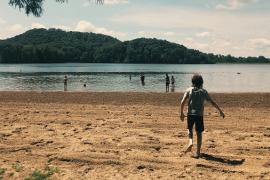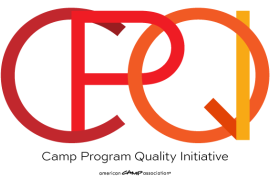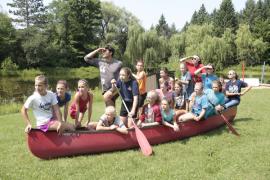I used to be a camp director, which means that, like many of you, my summers were spent in the whirl of camp. Each day flew into the next, and never did a day pass without a crisis (or 30). After ten weeks, I was left with a pile of mismatched socks and moldy towels and a deep sense that something had just happened, although I really did not know what.
Yet.
Because the energy of it all was still pulsing through my veins, and much of the momentum of camp was still in motion, like a freight train that only slowly comes to a stop. But within a month or so things did indeed stop, and the events of the summer started to come into focus. I could see that some things worked and others did not, and I could measure my success against my enrollment numbers, staff retention, and bottom line. Comments from parents helped too (the good ones of course), as did drawings from campers and thank-you notes (text messages) from staff. Most summers, I could roll into fall content that I did my job, that I was successful.
But when planning time for the next season rolled around, the metrics I used to measure my success the previous summer had lost their oomph. Enrollment was up, but I didn’t know why. We had about the same ups and downs with staff in previous years, so I couldn’t look at that as an indicator of success. We met our financial goals, but this only raised the bar higher for next year. None of this, in the gray months of the off-season, felt like success — or, at least not the kind of success that was going to fire me up for another year.
I wrote in the last several blogs about measures of enrollment, acknowledging that there are several ways to measure enrollment, and no single measure gives us a complete picture of how well we are doing our jobs. In this post, I want to offer a dimension of the story that we don’t often think about, but might be the trick to truly understanding this thing called success.
Do a quick search for “quotes about success” (yes, I did this, and so should you) and you’ll find that the majority of these quotes mention failure, like this one:
"Character cannot be developed in ease and quiet. Only through experience of trial and suffering can the soul be strengthened, ambition inspired, and success achieved.” — Helen Keller
The role of failure in creating success is not new to those us living in this age of #leanin and #failforward, but failure is a terrifying thing to think about in the context of camp. Failure in our safety measures, for example, could result a tragedy; failure in our financial planning could mean lost revenue. But there are lots of places in between where small failures, even medium-sized failures, could be a tremendous opportunity for learning and growth.
Evaluation is one of those places. No one gets hurt when you give them a survey; you are not likely to lose significant money (in the short term, anyway) if you don’t. This is not to say there are not significant ethical considerations surrounding evaluation, but it means that evaluation is a space in which you can take small risks — like asking parents about what their child got out of their camp experience — without anyone losing a limb.
You are likely at or toward the mid-point in your summer. I remember that time well: midway through the race, but the end is not yet in sight. After you’ve taken a deep breath (I repeat, after you’ve taken a deep breath), consider taking one small risk in your evaluation efforts. Here are some ideas:
- Add three to four questions to a parent survey asking them to think about what their child got out of camp. ACA’s Staff and Parent Perceptions Tool might help.
- Task a small group of staff with going around camp and filming camper reactions to the question “What did you learn at camp?” This same small group can then analyze responses and report at a staff meeting some of the primary themes.
- Task a small group of campers with going around camp and filming staff reactions to the question “What did you learn by working at camp?” Analyze these responses to use when recruiting staff next year, and know that you just planted a little seed in those campers’ minds about one day working at camp.
- Ask your staff to evaluate you. This can be as simple as asking them to write, anonymously or not, both have their benefits and drawbacks, responses to three statements: What’s working, what’s not, and one suggestion for improvement.
But there is one other way you might use evaluation to measure success, and that is to evaluate how you measure success. Enrollment, staff retention, and a budget that is in the black are the indicators we tend to lean on most heavily, and for good reason. Without campers, we can’t do the business of camp. But I have argued before, and I’ll argue here once more, that outputs such as these show you the result of your work, but they don’t tell you how you got there or why it matters.
Measuring how and why are difficult tasks, but there is a very simple thing you can do right now to get started. You see, you are living, right now, in the very epicenter of your work — the belly of the beast, so to speak. At no other time during the year will you be more immersed in the how and the why than you are right now. You are literally swimming in data. But to capture all that data would be a big effort — one that you probably don’t have the capacity for right now.
Let’s think about perhaps the most accessible source of data you have right now — yourself. If you are anything like I was when I was a camp director, you are internalizing thousands of data points every day, and, like me, you are likely to forget the vast majority of this rich detail in the off season. And I would bet the data that is going to feed you most during the long months of planning will be data about what you are doing right now to be successful.
All you need is a piece of paper (or if you’re techy you can use a computer or even video). Take just a few minutes and write down the first thoughts that come to your mind about success (and failure, because they are inseparable) as you are experiencing it right now. Here are some prompts to get you started:
- The result of a change I made this year so far appears to be_______________.
- The scariest thing I did so far this summer is _________________.
- I know campers are growing while at camp because____________.
- I know my staff are growing while working here because ________________.
- A change I wish I made before the season started is____________________.
- Right now, I’m feeling most anxious about______________________.
- Right now, I’m feeling most confident about____________________.
- By this time next year, I’d like to feel more/less_________________.
- I know that I’m making a difference in campers’ lives because_____________.
- I’m a great at what I do because__________________.
Call it affirmation, call it touchy-feely, call it whatever you want. I call it data — data that will give you insight into the success (and precious failures) that you are experiencing right now, and you’ll want that insight many months from now when you are gearing up to do it all over again.
Now go be successful evaluators!
Photo courtesy of Camp Ramah Darom in Clayton, Georgia
Laurie Browne, PhD, is the director of research at ACA. She specializes in ACA's Youth Outcomes Battery and supporting camps in their research and evaluation efforts. Prior to joining ACA, Laurie was an assistant professor in the Department of Recreation, Hospitality, and Parks Management at California State University-Chico. Laurie received her PhD from the University of Utah, where she studied youth development and research methods.
Thanks to our research partner, Redwoods.
Additional thanks goes to our research supporter, Chaco.
The views and opinions expressed by contributors are their own and do not necessarily reflect the views of the American Camp Association or ACA employees.




